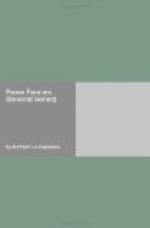Remembering that percentage of wise men, the formula of a nation were perhaps more truly stated in our first mathematical image. The wise men in a nation are as the units with the noughts in front of them. And when I say wise men I do not, indeed, mean merely the literary men or the artists, but all those somebodies with some real force of character, people with brains and hearts, fighters and lovers, saints and thinkers, and the patient, industrious workers. Such, if you consider, are really no integral part of the nation among which they are cast. They have no part in what are grandiloquently called national interests—war, politics, and horse-racing to wit. A change of Government leaves them as unmoved as an election for the board of guardians. They would as soon think of entering Parliament or the County Council, as of yearning to manage the gasworks, or to go about with one of those carts bearing the legend ‘Aldermen and Burgesses of the City of London’ conspicuously upon its front. Their main concern in political changes is the rise and fall of the income-tax, and, be the Cabinet Tory or Liberal, their rate papers come in for the same amount. It is likely that national changes would affect them but little more. What more would a foreign invasion mean than that we should pay our taxes to French, Russian, or German officials, instead of to English ones? French and Italians do our cooking, Germans manage our music, Jews control our money markets; surely it would make little difference to us for France, Russia, or Germany to undertake our government. The worst of being conquered by Russia would be the necessity of learning Russian; whereas a little rubbing up of our French would make us comfortable with France. Besides, to be conquered by France would save us crossing the Channel to Paris, and then we might hope for cafes in Regent Street, and an emancipated literature. As a matter of fact, so-called national interests are merely certain private interests on a large scale, the private interests of financiers, ambitious politicians, soldiers, and great merchants. Broadly speaking, there are no rival nations—there are rival markets; and it is its Board of Trade and its Stock Exchange rather than its Houses of Parliament that virtually govern a country. Thus one seaport goes down and another comes up, industries forsake one country to bless another, the military and naval strengths of nations fluctuate this way and that; and to those whom these changes affect they are undoubtedly important matters—the great capitalist, the soldier, and the politician; but to the quiet man at home with his wife, his children, his books, and his flowers, to the artist busied with brave translunary matters, to the saint with his eyes filled with ’the white radiance of eternity,’ to the shepherd on the hillside, the milkmaid in love, or the angler at his sport—what are these pompous commotions, these busy, bustling mimicries of reality? England will be just as good to live in though men some day call her France. Let the big busybodies divide her amongst them as they like, so that they leave one alone with one’s fair share of the sky and the grass, and an occasional, not too vociferous, nightingale.




